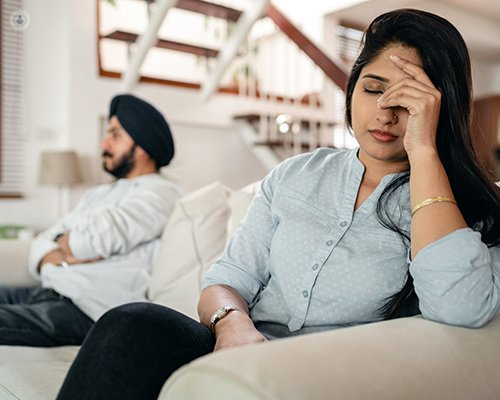How is the COVID-19 pandemic changing our relationships?
Written by:During the coronavirus pandemic, many may feel a strain on their relationships with their partner, friends or colleagues. This could be due to general stress from the pandemic itself in combination with the social distancing rules and working from home. We asked one of our expert psychologists and psychotherapists Dr Nicky Kimber-Rogal just what we can do to positively manage our relationships during the latest lockdown*.

Is COVID-19 changing our relationships?
There are many and varied types of relationships, such as family, friends, romantic, work; relationships that operate in caring settings and even the relationship with one’s self. A relationship automatically implies that there are two separate entities with the relating happening in between. This can even be true in terms of the individual self, in that people talk to themselves and treat themselves in certain way as if they were talking to somebody else.
Examples of this self-talk may be underlying beliefs such as: “You should be socialising more", "working harder", "holding everything together," and this type of relationship with the self can cause bigger problems during COVID-19 lockdowns and restrictions. This is because people are apt to ruminate without a real person in front of them who could adjust some of the demands they put upon themselves and therefore feel less isolated.
Is the quality of friendships declining?
In terms of friendships, many of my clients feel isolated for a number of reasons. They think texting and remote platforms lose the intimacy and “feel” of being with another person, where body language and other social cues can be picked up.
It seems that also some demoralisation has taken place where the effort of making real social contact (via Skype, Zoom, Facetime etc.) goes lower down the agenda because of immediate work and family constraints.
What are some top tips for managing relationships during lockdown?
People can be working part-time remotely and part-time in their office. This seems to be a better work balance but still, the ‘work-life’ balance can often need adjusting. People need ‘downtime’ where they can ‘really’ meet others rather than being alone.
Managing any type of relationships necessitates self-disclosure so expressing what you are feeling and what you want to with those around you is always helpful. You could, for example, commit to a social event which is even something simple like consistent time for a meal with a partner at home, perhaps when the children are in bed.
Another element is the geographical location and home environment. Some are working from high floor flatshares and others are working from homes where they look out from their houses onto community life.
It is helpful to have a community to live in where joint ventures such as street music, charity collections and other initiatives help people to feel less isolated and more that they are giving of their own competencies and skills.
Even if you are not working, and there is not too much financial pressure, learning new skills and attending remote lectures/webinars of interest is also a way to structure the day. Having structure reduces anxiety and depression.
What is your overall advice?
In my practice, I have seen several couples who find the demands of homeschooling and families being ‘on top of each other’ can be overwhelming. Alternatively, others have found positives in lockdowns – the parents are working from home without the hassle of the daily commute, they have learned more about the people in their family system through increased time together, and they feel an increased restfulness and lack of external demands.
In summary, people need a structure and connection in life. So during these difficult times, activities like planning a social walk, doing exercise of any sort and treating the workday as if they were the office can help. This could seem to some like having too many roles to cover: teacher to children, father, worker etc. but take a slower approach to any potential obstacles, delegate where possible and, above all, communicate feelings and thoughts and plan actions together. Man is not an island!
If you would like someone to talk to during these difficult times, you can make an appointment with Dr Kimber-Rogal via her Top Doctor’s profile here. She is available for video consultations, so you are able to receive professional help from the comfort of your own living room.
**The information published in this article about the coronavirus pandemic is with regards to what was happening in February 2021 and is subject to change.**


